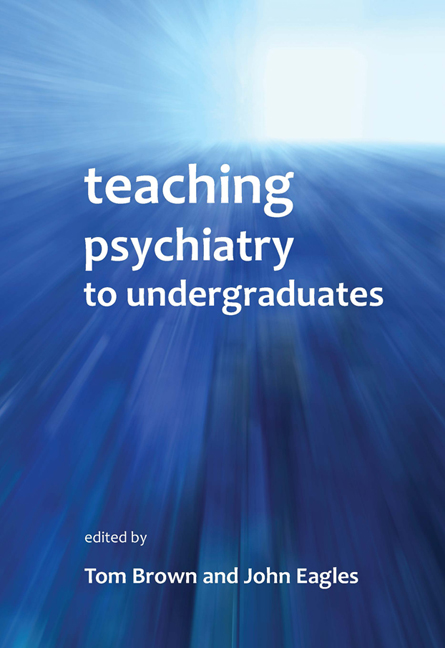Book contents
- Frontmatter
- Contents
- List of figures, tables and boxes
- List of contributors
- Preface
- Foreword
- 1 How do students learn?
- 2 Recent developments in undergraduate medical education
- 3 Undergraduate psychiatry teaching – the core curriculum
- 4 The organisation of undergraduate teaching
- 5 Assessment of undergraduates in psychiatry
- 6 Using computers to teach undergraduate psychiatry
- 7 How to give a lecture
- 8 How to do small-group teaching
- 9 Problem-based learning
- 10 Teaching trainee psychiatrists how to teach medical students: the Southampton model
- 11 Involving trainees in teaching
- 12 Involvement of service users in psychiatric education
- 13 Time-efficient clinical teaching
- 14 Intercalated degrees
- 15 Undergraduate experiences of psychiatry: a student view
- 16 Integration: teaching psychiatry with other specialties
- 17 Teaching the teachers in a cross-cultural setting: the Scotland–Malawi Mental Health Education Project
- 18 International undergraduate teaching
- 19 Teaching with simulated patients and role-play
- 20 Undergraduate medical education and recruitment to psychiatry
- 21 Choosing psychiatry: factors influencing career choice among foundation doctors in Scotland
- 22 Funding of the teaching of medical undergraduates
- 23 Dealing with students in difficulty
- 24 Training medical students to promote good mental health in secondary schools
- 25 Women in medicine
- Index
10 - Teaching trainee psychiatrists how to teach medical students: the Southampton model
- Frontmatter
- Contents
- List of figures, tables and boxes
- List of contributors
- Preface
- Foreword
- 1 How do students learn?
- 2 Recent developments in undergraduate medical education
- 3 Undergraduate psychiatry teaching – the core curriculum
- 4 The organisation of undergraduate teaching
- 5 Assessment of undergraduates in psychiatry
- 6 Using computers to teach undergraduate psychiatry
- 7 How to give a lecture
- 8 How to do small-group teaching
- 9 Problem-based learning
- 10 Teaching trainee psychiatrists how to teach medical students: the Southampton model
- 11 Involving trainees in teaching
- 12 Involvement of service users in psychiatric education
- 13 Time-efficient clinical teaching
- 14 Intercalated degrees
- 15 Undergraduate experiences of psychiatry: a student view
- 16 Integration: teaching psychiatry with other specialties
- 17 Teaching the teachers in a cross-cultural setting: the Scotland–Malawi Mental Health Education Project
- 18 International undergraduate teaching
- 19 Teaching with simulated patients and role-play
- 20 Undergraduate medical education and recruitment to psychiatry
- 21 Choosing psychiatry: factors influencing career choice among foundation doctors in Scotland
- 22 Funding of the teaching of medical undergraduates
- 23 Dealing with students in difficulty
- 24 Training medical students to promote good mental health in secondary schools
- 25 Women in medicine
- Index
Summary
Introduction
This chapter offers an example of education development in practice – a case study of how many of the ideas in this book can come together in the context of a particular medical school. The chapter focuses on ways that junior staff can be trained for education roles and illustrates how the recommendations of the General Medical Council (GMC) and the core competencies of the Royal College of Psychiatrists (RCPsych) can be delivered through a bespoke training programme. The chapter raises a number of issues that all practitioners embarking on the development of a training programme need to consider and also presents evaluation data that confirms the success of the approach adopted at the Southampton School of Medicine.
Background
The School of Medicine
The School of Medicine at the University of Southampton is widely recognised as one of the leading institutions in the UK for undergraduate medical education. Following a successful bid to the Department of Health, student numbers at the School have expanded rapidly over the past few years, with a 47% rise to an intake of 250. The School has also developed two innovative and ambitious new programmes: a 4-year graduate entry programme for graduates of all disciplines; and a 6-year widening access programme. These two programmes are closely integrated with the traditional 5-year, school-leaver programme. The three programmes vary in detail but all the students experience early patient contact, an integrated basic science curriculum, student-selected modules and a curriculum designed to offer ‘spiral’ learning from one year to the next. All students experience extensive training on clinical rotations throughout the South Central Region of the National Health Service (NHS) and neighbouring areas – involving staff from a total of 21 NHS trusts, including nine mental health trusts.
The expansion at Southampton has increased the need for staff development, for new staff and for staff at newly established medical student teaching centres around the region. The School has a Medical Education Division, which runs a highly successful staff development programme, recently commended by the General Medical Council (Hill & Stephens, 2004; General Medical Council, 2008). The Division has worked closely with the undergraduate leads for the mental health attachments to ensure timely and effective training for psychiatrists involved in teaching.
- Type
- Chapter
- Information
- Teaching Psychiatry to Undergraduates , pp. 119 - 129Publisher: Royal College of PsychiatristsPrint publication year: 2011



